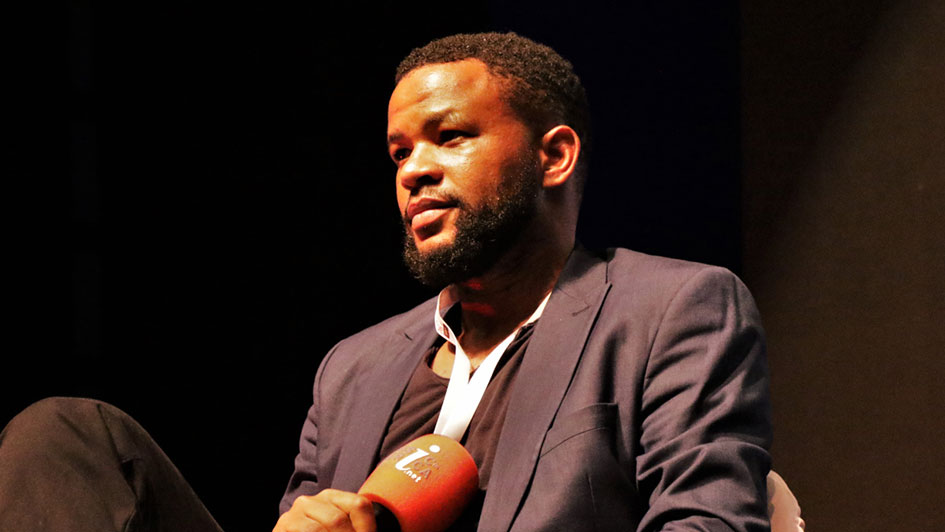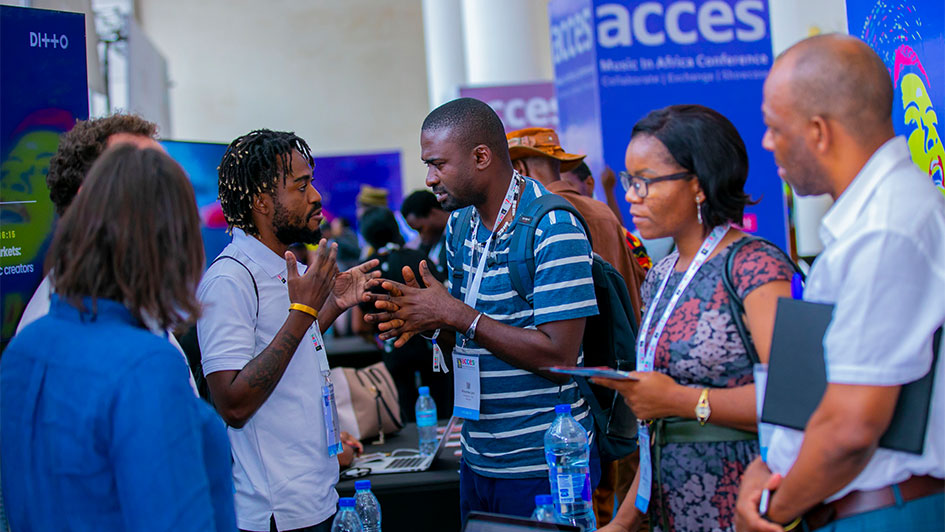
»Music In Africa is like an ever-growing magnet for musicians and it is attracting more and more people from the industry.«
“We’re part of the DNA of African music!”
Since 2013, pan-African music network ‘Music In Africa’ has been a magnet drawing musical artists from all over Africa. The network has a constant beating pulse on the web. The impulse generated, however, when creative minds come together from across the continent is an issue explored by our report on the ACCES Conference 2022.
“African music runs in our DNA!” A beaming smile accompanies these proud words by Eddie Hatitye. It is Saturday afternoon, the last day of the unique event that is the pan-African music conference ACCES. The foyer of the Julius Nyerere International Convention Centre is buzzing and humming. Everywhere you look, there is something to see, whether it be the various panels, workshops or symposia. The atmosphere is relaxed and casual. And Eddie Hatitye’s relief is also palpable. As Managing Director of Music In Africa, he is responsible for the organization of ACCES 2022 in Dar es Salaam and has been working since February on preparation for the event in Tanzania’s largest city.
The topics that are relevant to us are also becoming more and more diverse.
Every year at the end of November, Music In Africa organizes the three-day conference – with the event always taking place in a different African country. This means having to make new contacts each year, acquire new local cooperation partners and network with all the various parties involved on site. So, needless to say, Hatitye is very happy and grateful that everything has run so smoothly and that all the various cogs have intermeshed to pave the way for a successful event – the first of its kind to be held in East Africa: “You can see the importance of being able to rely on a strong network. This is something that we have built on and expanded over the years. And it’s amazing. Music In Africa is like an ever-growing magnet for musicians and it is attracting more and more people from the industry. The topics and issues that are relevant to us are also becoming more and more diverse.”
The architecture of the building, being generously dimensioned and airy in character, also underscores the importance of this conference – serving as a visual testament to the significance of the event, so to speak. “We have also started to attract the attention of governments. For example, the Tanzanian Ministry of Art and Culture provided us with tremendous support for the ACCES in Dar es Salaam. More and more state authorities from across the continent are taking an interest in the work of Music in Africa and it’s just fantastic,” says Maimouna Dembélé from Senegal, Chairperson of the Music In Africa Foundation. Her greatest wish has now come true after two years of disappointment. The coronavirus pandemic meant that only a very limited version of the event could be held in Johannesburg in 2021, while the 2020 conference had to be canceled in its entirety. This year will see representatives from the African music culture and music industry all come together once again in person. ACCES is becoming the heart of a pan-African music network, providing a setting for people to meet in person and talk face to face. And its pulse has a constant beat on the web.

“Networking is the keyword that describes the work of Music In Africa. We want anyone interested in or working with music from every African country to be able to meet with others like-minded individuals.” Maimouna Dembélé adds that the physical, in-person event that was the ACCES 2022 in Dar es Salaam was only possible thanks to an extensive process of digital networking that spanned years. Without this process, Music In Africa would not have enjoyed its tremendous success. And this is precisely the key point for Jens Cording from Siemens Stiftung: “From the very outset, our support of Music In Africa was based on the concept of a connected society and this is something that played a key role for us.”
Particularly during the coronavirus pandemic, these long-term networking strategies proved to be highly effective. Our communication and digital presence were also further expanded. For example, the Music In Africa Live initiative was developed against this background. The initiative gives musicians the means to present themselves in a professional manner and to offer a marketable product. Whereas previously musicians recorded their live performances on a mobile phone from their bedrooms or living rooms, this initiative offers performers a genuine digital stage to share their artistic talent. The idea is that the musician can go on to benefit from online concerts and acquire an audience.
Another benefit of the Music In Africa network was highlighted by a recent study on the actual income of musicians in South Africa. A total of 3,000 artists took part in the survey and provided information about how they earn their income on a day-today basis. The results of the survey have certainly given Jens Cording food for thought: as a musician, it is quite difficult to survive on proceeds from concert performances alone. Having more than one job is part and parcel of day-to-day life for someone working in the music industry, whether as a music teacher, studio operator or producer. This often includes working in sectors other than the music industry. Moreover, the income that can be generated from streaming services is generally very low. This poses the question of how Music In Africa could help musicians to earn a living online in the future by utilizing its strong networking backbone.
Report: “Revenue Streams for Music Creators in South Africa”
The study is part of the Revenue Streams for African Musicians project, which provides relevant information as well as training opportunities for African musicians.
A long-time and avid supporter of the network, he believes the current openness of the African music scene is a great advantage: “In my experience, and this applies in particular to the ACCES conference, local actors are very interested in working together across borders. There are some harder borders drawn in Europe, especially in the cultural and political sphere. Many states are now seeing the tremendous opportunity and potential capital gains offered by their artists. Understanding is coming slowly, but it is coming nevertheless.”
Looking at connected societies gives us an opportunity to critically reflect.
Meanwhile, Music In Africa now has a presence in all 54 African countries and boasts several thousand clicks a day by site visitors. Every month, 500,000 individual users visit the online platform to look for information, be it information on copyrights or income opportunities in streaming services or on funding opportunities and grants. Producers, music managers and artists find ways to connect with each other on the platform. For Siemens Stiftung board member Dr. Nina Smidt, the fact that Music In Africa has been an active player on the Internet for so many years is a big plus from a global perspective. Africa is a huge continent that can be reached in just a few mouse clicks. Music In Africa offers a large network for creative musicians. Smidt’s work here is generally focused on exploring the opportunities that arise with increased digital networking, but also the risks. “Looking at networked societies gives us an opportunity to critically reflect on the question of how we treat each other. What is the significance of personal contacts and direct encounters with people? Has there been any shifts or changes as a result of entering this digitalized space?”
Smidt’s visit to ACCES 2022 in Dar es Salaam illustrated to her that not everything can be digitally mapped. Online contact is not the same as direct contact. This is something that was quite evident at the conference, a forum that allowed people to come together and be inspired, to acquire new information and to experience these great concerts live and in person. “This is why we at Siemens Stiftung need to look at how we can utilize platforms in the future to reach more people and to take them along with us. At the same time, however, we must ask ourselves how we can facilitate personal encounters and personal exchange and identify the special challenges, especially in Africa, that are facing a network like Music In Africa and the networked society.”
Contacts
Eddington Hatitye
+27 10 140 1317


